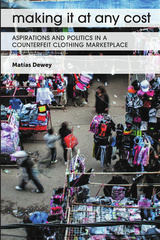Portraits of Persistence
Inequality and Hope in Latin America
Profiles of triumph and hardship amid massive inequality in Latin America.
Each chapter of Portraits of Persistence, a project of the University of Texas Urban Ethnography Lab, offers an intimate portrait of one or two individual lives. The subjects are a diverse group of individuals from across the continent: grassroots activists and political brokers, private security entrepreneurs, female drug dealers, shantytown dwellers, and rural farmers, as well as migrants finding routes into and out of the region. Through these accounts, the writers explore issues that are common throughout today's world: precarious work situations, gender oppression, housing displacement, experiences navigating the bureaucracy for asylum seekers, state violence, environmental devastation, and access to good and affordable health care. Carefully situating these experiences within the sociohistorical context of their specific local regions or countries, editor Javier Auyero and his colleagues consider how people make sense of the paths their lives have taken, the triumphs and hardships they have experienced, and the aspirations they hold for the future. Ultimately, these twelve compelling profiles offer unique and personal windows into the region’s complex and multilayered reality.
Rigorously referenced, this is an essential title for collections dedicated to Hispanic and Latine interests.
Portraits of Persistence is an invaluable addition to any discussion of Latin America, poverty, political instability, neoliberalism, gender, indigenous populations, and more. It goes beyond what statistical or demographic descriptions provide to give a poignant view of the lives of ordinary humans in often extraordinary circumstances. It is ideal for courses in ethnographic research, sociology, political science, Latin American Studies and more, or as an interesting and informative read on its own.
By situating each life story within its broader sociohistorical context, the writers and subjects of Portraits offer unique perspectives into Latin America’s complex reality — and offer deeply compelling stories of lives shaped by hardship and hope.
Portraits of Persistence is a breath of fresh air. Auyero has brought to life a fascinating collection of well-crafted and unique personal accounts to form a richly engaging narrative. I cannot think of any other publication that brings together such high-quality materials building on the tradition of testimonio. This will undoubtedly establish new standards of research into the ‘everyday’ to illuminate the reality of regular peoples’ lives.
Through incisive ethnographic narratives, Portraits of Persistence outlines how the broad trends that shape contemporary life in Latin America are revealed in the most intimate aspects of people’s lives. Each chapter is a gem, revealing the specificities of multilayered local realities while forming a unified thread to depict what persistence looks and feels like under the seemingly insurmountable obstacles that face people in an unjust world. Portraits of Persistence breaks from the usual academic style while retaining the most powerful features of a classic ethnography. Highly recommended!
Portraits is an outstanding collection that combines sociological life history with the Latin American tradition of testimonio literature, to provide twelve compelling stories of people navigating the durable and cruel inequalities of our world. Chapters cover the region from the Southern Cone to the US Gulf Coast, showing how individuals confront, adapt, alter, and navigate the macrosocial processes they find themselves in. Forced displacement, the drug economy, urban violence, informal labor, and multiple facets of structural disadvantage provide the context in which people forge ahead, create spaces of agency, and craft their lives, These stories provide neither voyeuristic shock nor breezy inspiration. Rather, in the best ethnographic tradition, they humanize what seems strange, and make understandable what seems inexplicable.
Javier Auyero is the author or coauthor of many books, including The Ambivalent State: Police-Criminal Collusion at the Urban Margins. He is the Joe R. and Teresa Lozano Long Professor in Latin American Sociology at the University of Texas at Austin, and Ikerbasque Research Professor at the University of the Basque Country.
- Introduction (Alison Coffey and Javier Auyero)
- Chapter 1. Soraya, la Reina del Sur in Nicaragua (Dennis Rodgers)
- Chapter 2. Maíra: Mothering and Struggle in the Shadow of State Violence (Alison Coffey)
- Chapter 3. Rodrigo: “Many Secrets, Nothing to Hide”—Security Entrepreneurship in Mexico City (Eldad Levy)
- Chapter 4. Fabio and Angélica: The Resistance of Staying Put (Alex Diamond)
- Chapter 5. Doris Huaiquian: Newen, Tenacity of Spirit (Cinthya E. Ammerman)
- Chapter 6. Aurelia: Displacement, Toxicity, and the Struggle for Home (Maricarmen Hernández)
- Chapter 7. Hamid: A Life Deferred in Brazil (Katherine Jensen)
- Chapter 8. María: Obligated by Circumstances—From Temporary to Precariously Permanent in the United States (Jennifer Scott)
- Chapter 9. Ezequiel: A Laburante in Argentina’s Relegated Neighborhoods (Marcos Perez)
- Chapter 10. Nelson and Celia: Feeling Potholes and Debt in the Bones (Jorge Derpic)
- Chapter 11. Big Love: A Political Broker at Work (Javier Auyero and Sofía Servián)
- Chapter 12. Alberto: Service Work and Social Change in Argentina (Katherine Sobering)
- Afterword (Javier Auyero)
- Acknowledgments
- Contributors
- Index







